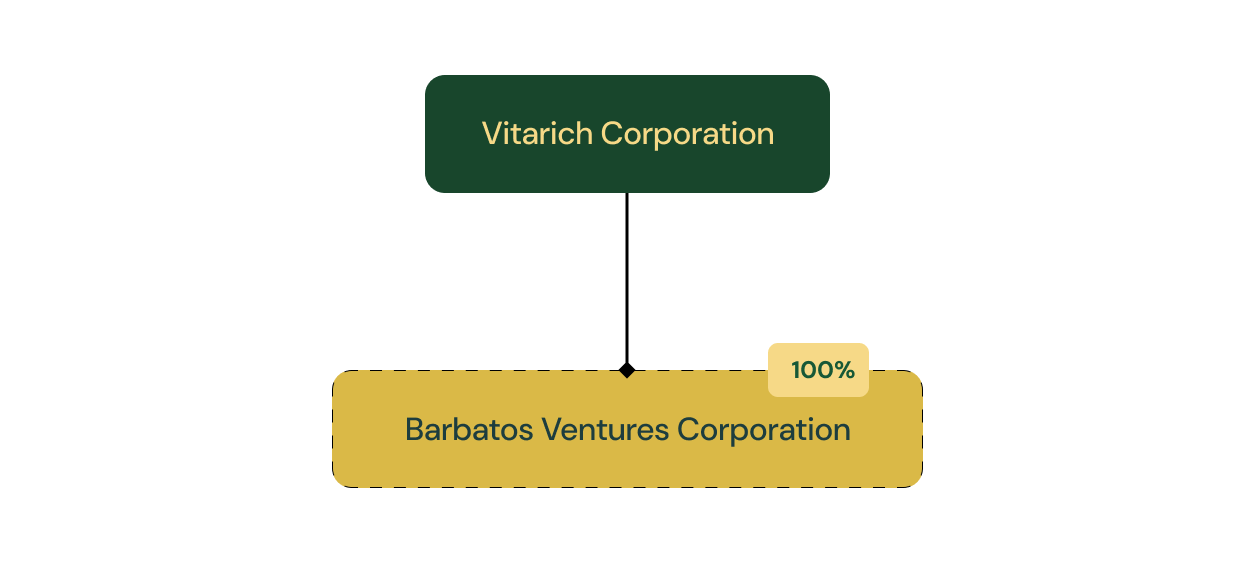Gromax, Inc. is a wholly owned subsidiary of Vitarich, which started commercial operation in January 1996. Previously, Gromax was a division of Vitarich, which was spun off to a separate entity. Gromax was registered with SEC on November 10, 1995.
Effective April 1, 2015, the operations of Gromax, manufacturing animal health and nutritional feeds, was reintegrated into the Company. Specialty feeds supplement the product offering of animal feeds produced by the Company. Pursuant to the reintegration, Gromax transferred all its employees to the Company. Retirement benefits accruing to these employees were transferred accordingly.
Philippine’s Favorite Chicken Inc. (PFCI), one of the subsidiaries of Vitarich, entered into distribution agreements in 1995 with America’s Favorite Chicken Company (AFC), a Company that operates the Church’s Chicken and Popeye’s Chicken restaurants in the United States. Under these distribution agreements, PFCI will distribute the paper goods, restaurant supplies, equipment, and food products to Texas Manok Atbp. Inc. (TMA). The latter corporation, which is owned by the Sarmiento family, in turn, entered into a development and franchise agreement with AFC. Under the development agreement between TMA and AFC, PFCI was granted the exclusive right to develop an aggregate of fifty (50) Texas Chicken and fifty (50) Popeye’s Chicken restaurants in the Philippines in consideration for territorial and franchise fees payable to AFC as stipulated in the agreements. In addition, a 5% percent royalty fee based on sales is assessed for each franchised restaurant. This royalty is being paid by TMA, the operator of the restaurant.
The franchise agreement allows the PFCI to use the Texas Chicken and Popeye’s Chicken trade names, service marks, logos, food formulae and recipes, and other exclusive rights to the proprietary Texas and Popeye’s Chicken System.
The development of the restaurants is scheduled over a period of seven years starting in 1995 for Texas Chicken and 1996 for Popeye’s. The franchise agreement shall be for a period of ten (10) years for each restaurant unit, renewable for four additional periods of five years each, at the option of the franchisee. However, PFCI, in 2000, lost its right to develop Popeye’s Chicken in the Philippines.
On October 1, 1998, the Board of Directors of PFCI approved the conversion into equity of the advances of Vitarich Corporation to PFCI amounting to 165 million to be applied to its unpaid subscriptions and for additional shares of stock of PFCI. Out of the 165 million advances to be converted into equity, 25 million was applied to Vitarich’s unpaid subscription while the remaining 140 million was shown under Deposit on Future Stock Subscriptions account pending the approval from the SEC of the conversion.
In 2003, PFCI reverted the investment in shares of stock in PFCI to Advances to subsidiaries amounting to 140 million, as the Board of Directors of PFCI decided not to pursue its application with the SEC to convert into equity the advances received from Vitarich. PFCI initially recorded the transaction as an increase in investment in shares of stock in PFCI and a decrease in advances to subsidiaries when the Board of Directors of PFCI approved the proposed conversion in 1998.
AFC unilaterally terminated its development and franchise agreements with PFCI in 2001. As a result, in August 2001, PFCI and TMA filed a case against AFC and some of AFC’s officers, such as Tom Johnson, Anthony Pavese and Loreta Sassen, among others, for undue termination of the development and franchise agreements with the Regional Trial Court of Pasig City, docketed as Civil Case No. 68583. The case called for injunction, specific performance, sum of money, and damages against AFC and some of its officers.
In connection with such legal action, in 2001, PFCI recognized as claims receivable, as of December 31, 2001, certain losses arising from the closure of certain Texas Chicken restaurants and legal fees incurred relating to the case filed against AFC. Losses recognized as claims receivable include, among others, the loss on write-off of leasehold and building improvements relating to the closed stores. The total amount recognized as claims receivable (presented as part of Other Non-current Assets account in the condensed interim consolidated balance sheets) totaled 23.2 million as of December 31, 2001.
The Regional Trial Court of Pasig City, in a decision dated April 3, 2002, approved the issuance of a preliminary writ of attachment on the properties of AFC in the Philippines upon posting of PFCI and TMA of a bond amounting to 100 million. Management believed that this case would be settled in favor of the PFCI and TMA.
On September 24, 2003, the trial court granted the Motion to Dismiss filed by two of the defendants. PFCI, in turn, filed a Motion for Partial Reconsideration of the order. Moreover, AFC has filed a Petition for Certiorari before the Court of Appeals assailing the validity of the trial court previously issued writ of attachment.
On December 22, 2004, the parties have entered into a compromise agreement for the settlement of the case of which the parties have filed a joint motion to dismiss before the Regional Trial Court of Pasig City, Branch 152.
On March 4, 2005, the Regional Trial Court of Pasig City, Branch 152 had approved the Joint Motion to Dismiss filed by the parties based on the Compromise Agreement entered into by them, thus, putting an end to the case.
In 2005, the Company discontinued operations of its Texas Manok’s Restaurants. Accordingly, it terminated all its employees and provided full valuation allowances on all its remaining assets.
Although the BOD and stockholders have not yet formally adopted a plan to liquidate the Company, the financial statements are presented under the liquidation basis of accounting to appropriately reflect the significant changes in the Company’s status of operations.





